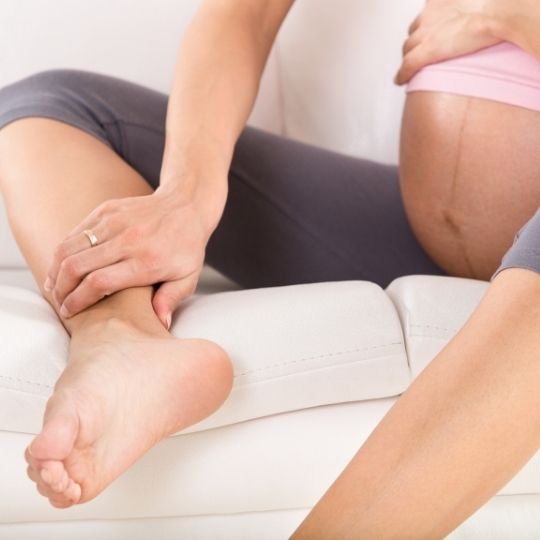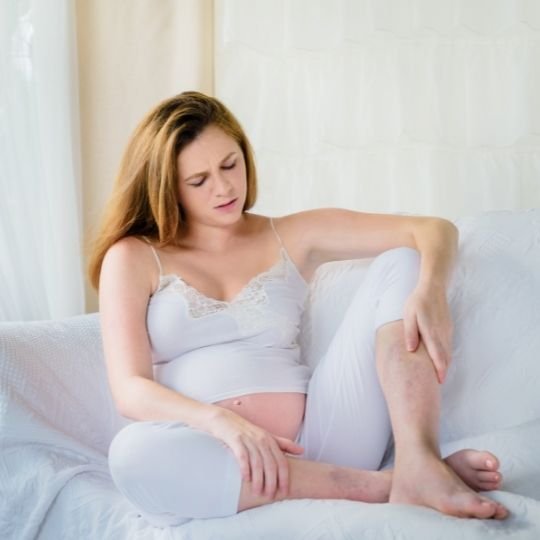Are You Experiencing Foot Pain During Pregnancy?
A lot of women experience foot pain in pregnancy. Symptoms ranging from aches and pains to swollen feet.
Swollen feet and swollen ankles are more commonly heard of as pregnancy symptoms. Many women also experience foot pain. Foot pain feels like aching and throbbing in the heel, ball or arch of the foot.
Swollen Feet
Are Swollen Feet During Pregnancy Normal?
A lot of women experience “fat feet” during pregnancy. Swelling in the feet and around the ankles during pregnancy is medically known as Edema.
Swelling can also occur in the hands, arms and face. If you notice this kind of swelling in the hands or other areas, please contact your doctor or midwife as it could be s sign or preeclampsia.
Your legs could be absolutely fine in the morning and their normal size. Then during the day they start slowly swelling up:
- Ankles swell up
- Shoes feel tight and uncomfortable
- Legs get heavy and ache
- Feet become swollen
By the end of the day it can be quite unbearable as the swelling exerts a tightness and pressure.

What Causes Swollen Feet During Pregnancy?
Why Women Experience Swelling Feet During Pregnancy
- Increase in blood volume by up to 50% which can cause swollen feet because your body has more blood to circulate, however, your enlarged uterus causes more pressure to be put upon your pelvis and legs, slowing blood circulation down to extremeties. As a result, blood tends to pool in our ankles and feet which leads to swelling feet and swollen ankles.
- Pumping of blood back up the lower legs can slow down or be less effective, leading to Varicose Veins.
- Blood vessels in our toes are very small and fluid can leak out in to other tissues in the feet, causing more throbbing and swelling.
- Water rentention can further add to the swelling. Pregnancy hormones make our bodies retain more water in order to supply nutrients to the placenta. Fluids gather in our ankles and feet during the day, due to the pull of gravity and poor circulation, leading to fluid retention.
- Weight gain can cause swelling during pregnancy. Extra weight puts more pressure on blood circulation in the lower legs, again leading to fluid retention.
Thankfully, the condition of “fat feet“ is only temporary and water retention should gradually ease off following birth.
When do Swollen Feet get Better?
It is normal to experience and increase in swelling in pregnancy week by week, as your baby grows and your body weight increases. Many women experience more problems with swollen feet during their third trimester.
Thankfully, the condition of “fat feet“ is only temporary and should gradually ease off following birth.
Flat Feet
Can Pregnancy Cause Flat Feet?
Flat feet? Yes you can get flat feet from pregnancy – medically known as over-pronation.
How will you know if you are getting flat feet? What are flat foot pregnancy symptoms?
- More than likely the arch of your foot will feel painful
- Walking may cause you to feel pains in the sole of your foot
- The pain you feel may radiate to your calf muscles, legs and lower back
- You may find that your toes are touching the end of your shoes when they weren’t before
- Or you may notice that your feet start to roll inwards when walking

What Causes Flat Feet During Pregnancy?
- The tissue between the heel and ball of the foot gets inflamed due to stretching and pressure of extra weight, which could make walking quite painful.
- This tissue (plantar fascia) holds up the arch of the foot. Therefore if it gets swollen or inflamed, it may no longer be able to hold up the arch of the foot sufficiently, causing the arch to drop and the foot to lengthen slightly.
- Extra weight exertion of pregnancy on the feet could cause the arch of the foot to lower or collapse.
- The lowering or collapse of the foot arch could result in feet being longer than before pregnancy.
How to Help Swollen Feet During Pregnancy and how to Prevent Flat Feet
- Sleep on your left side as this relieves pressure on the largest vein running to your heart.
- Look after your feet and wear comfortable, supporting shoes that can be easily loosened to cope with any swelling.
- Ensure footwear has ample room, avoid anything tight or shoes with pointed toes as these can hinder good blood circulation.
- Experts recommend avoiding going barefoot too much.
- Avoid standing for long periods or sitting for long periods. Keep mobile: stretch your legs and feet often, do small foot exercises to keep your extremities activated.
- A good way to take the weight off is to go to the swimming pool, where you will feel lighter and can also use the water massagers to relieve the tension.
- If you are sitting for longer periods then avoid crossing your legs. Prop your feet up on a low stool.
- Wear looser fitting socks – some socks can dig in and prevent optimal blood circulation.
- If you experience more extreme swelling, you could wear pregnancy compression stockings (knee-high or thigh-high) during the day to help blood circulation.
- Keep your feet elevated as often as possible to reduce extra pressure on the lower legs.
Food & Drink to Avoid and Food & Drink that Can Help Relieve Symptoms
- Avoid drinking caffeine as it dehydrates. If you do drink cafeine, make sure you also drink enough water. By drinking plenty of water you help your body in keeping well-hydrated which helps to reduce swelling.
- Maintain a healthy balance of salt intake. Too much salt can also lead to dehydration.
- Drink fluids which are rich in iron. This helps to improve the blood circulation and can also help with other pregnancy symptoms such as leg cramps and feeling short of breath.
